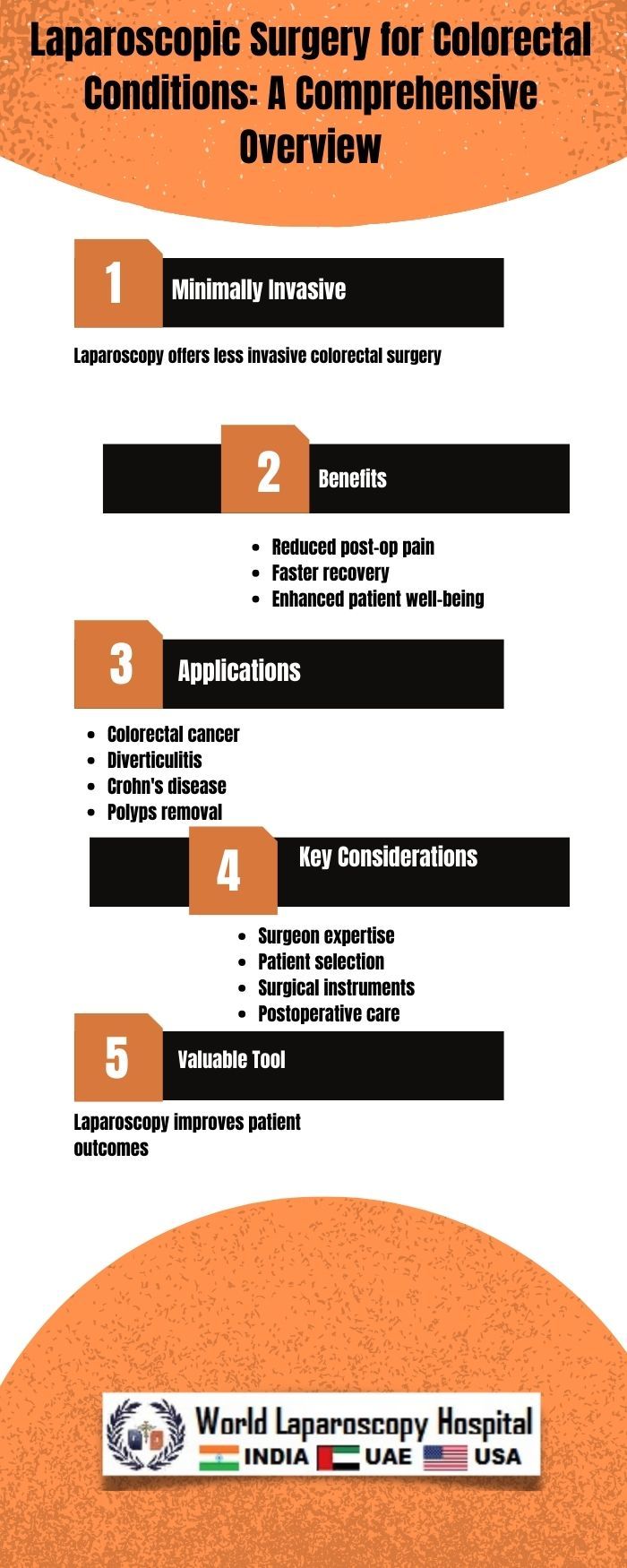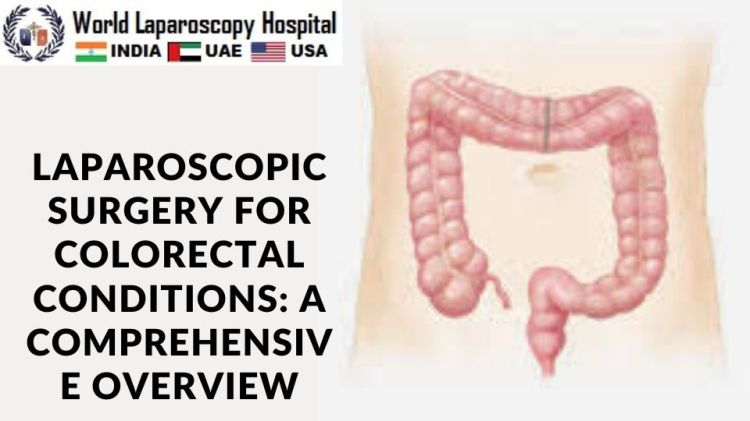Title: Laparoscopic Surgery for Colorectal Conditions: A Comprehensive Overview
Introduction
Laparoscopic surgery, also known as minimally invasive surgery, has revolutionized the field of colorectal surgery. With its numerous advantages, it has become a preferred choice for treating a wide range of colorectal conditions. As a surgeon based in Gurugram, you understand the importance of staying updated with the latest techniques and approaches in your field. In this comprehensive article, we will delve into the world of laparoscopic surgery for colorectal conditions, exploring its benefits, applications, key considerations, and its significant impact on patient outcomes.

Understanding Laparoscopic Surgery
Before we dive into the specifics of laparoscopic surgery for colorectal conditions, let's first establish a clear understanding of what laparoscopic surgery entails.
What is Laparoscopic Surgery?
Laparoscopic surgery, often referred to as minimally invasive surgery, involves making small incisions in the abdominal wall through which specialized surgical instruments and a camera are inserted. The camera, known as a laparoscope, provides a clear view of the internal organs on a monitor. Surgeons then perform the procedure while watching the monitor, using the instruments to manipulate and treat the affected area.
Advantages of Laparoscopic Surgery
The advantages of laparoscopic surgery are numerous and extend beyond the surgical field. As a surgeon, it's essential to appreciate these benefits, as they directly impact patient outcomes.
Reduced Postoperative Pain
Compared to traditional open surgery, laparoscopic procedures typically result in less postoperative pain. Smaller incisions mean less tissue damage and reduced trauma to the surrounding muscles, resulting in a more comfortable recovery for patients.
Faster Recovery
One of the most significant advantages of laparoscopic surgery is the quicker recovery time it offers. Patients often experience shorter hospital stays and can return to their daily activities sooner, contributing to an improved quality of life.
Enhanced Cosmetic Outcome
The smaller incisions used in laparoscopic surgery lead to minimal scarring. This cosmetic advantage is particularly appealing to patients who appreciate the aesthetic aspect of their surgical experience.
Reduced Risk of Infection
Smaller incisions also translate to a decreased risk of infection. This is a crucial consideration in colorectal surgery, where the risk of postoperative infection can have serious consequences.
Less Blood Loss
Laparoscopic surgery typically results in less blood loss during the procedure, reducing the need for blood transfusions and related complications.
Improved Quality of Life
Ultimately, laparoscopic surgery contributes to an overall improved quality of life for patients. It allows them to resume their regular activities and return to their daily routines more quickly, enhancing their well-being.
Applications of Laparoscopic Surgery in Colorectal Conditions
Now that we've established the advantages of laparoscopic surgery, let's explore its applications in treating colorectal conditions. As a surgeon in Gurugram, you may encounter various cases that could benefit from this approach.
Colorectal Cancer
Laparoscopic surgery has gained significant recognition in the treatment of colorectal cancer. It can be used for the removal of cancerous tumors, lymph nodes, and affected sections of the colon or rectum. The minimally invasive nature of the procedure is particularly valuable in cancer cases, as it reduces the risk of spreading cancer cells during surgery.
Diverticulitis
Diverticulitis is a common condition characterized by inflamed or infected pouches in the colon. Laparoscopic surgery can be employed to remove the affected portion of the colon, effectively treating diverticulitis while minimizing postoperative discomfort.
Crohn's Disease
For patients with Crohn's disease, laparoscopic surgery can be used to manage complications such as bowel strictures, abscesses, or fistulas. This approach allows for targeted treatment while preserving as much healthy tissue as possible.
Polyps Removal
Colorectal polyps, which may be precursors to cancer, can be safely removed using laparoscopic techniques. This preventive measure is essential in reducing the risk of colorectal cancer development.
Key Considerations for Successful Laparoscopic Surgery
While laparoscopic surgery offers numerous advantages, it's crucial to approach each case with careful consideration of key factors to ensure successful outcomes.
Surgeon Expertise
As a surgeon, your expertise in laparoscopic techniques is paramount. Mastery of the specialized instruments and the ability to navigate the surgical field using a laparoscope are critical skills to develop and maintain.
Patient Selection
Not all patients may be suitable candidates for laparoscopic surgery. Factors such as the patient's overall health, the extent of the disease, and previous surgeries must be carefully evaluated to determine the most appropriate approach.
Surgical Instruments
Having access to advanced laparoscopic instruments is essential for successful surgeries. Stay updated with the latest technology and equipment to optimize patient care.
Postoperative Care
The postoperative care of laparoscopic surgery patients is slightly different from that of open surgery. Patients should receive appropriate guidance and follow-up care to ensure a smooth recovery.
The Impact of Laparoscopic Surgery on Patient Outcomes
As a surgeon based in Gurugram, you have the opportunity to witness firsthand the positive impact of laparoscopic surgery on patient outcomes. This section highlights some of the key aspects that make this approach a valuable tool in your surgical practice.
Reduced Healthcare Costs
Quicker recovery times and shorter hospital stays associated with laparoscopic surgery translate to reduced healthcare costs for patients and healthcare systems. This economic benefit is particularly significant in the Indian healthcare context.
Enhanced Patient Satisfaction
Patients often express higher satisfaction with laparoscopic surgery due to the reduced pain, faster recovery, and improved cosmetic outcomes. Positive patient experiences can contribute to a thriving surgical practice.
Lower Complication Rates
Laparoscopic surgery is associated with lower rates of surgical complications, such as wound infections and hernias. This not only benefits patients but also contributes to your reputation as a skilled surgeon.
Improved Surgical Precision
The magnified view provided by laparoscopic cameras allows for exceptional surgical precision, minimizing the risk of damage to surrounding tissues and organs.
Advancing Medical Technology
As a surgeon, you have the opportunity to embrace cutting-edge technology in your practice. Stay updated with the latest advancements in laparoscopic surgery techniques and equipment to ensure the best possible outcomes for your patients.
Conclusion
Laparoscopic surgery has become a cornerstone of modern colorectal surgery, offering numerous advantages, applications, and improved patient outcomes. As a surgeon in Gurugram, embracing this minimally invasive approach can enhance your practice and benefit the patients you serve. By staying informed about the latest techniques, patient selection criteria, and surgical instruments, you can continue to provide high-quality care while minimizing the discomfort and recovery time for your patients. Laparoscopic surgery is not just a surgical technique; it's a path to improved patient well-being and surgical excellence.
